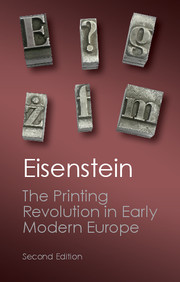Book contents
- Frontmatter
- Contents
- List of Illustrations and Maps
- Preface to the Second Edition
- Introduction
- THE PRINTING REVOLUTION IN EARLY MODERN EUROPE
- PART I THE EMERGENCE OF PRINT CULTURE IN THE WEST
- PART II INTERACTION WITH OTHER DEVELOPMENTS
- 5 The Permanent Renaissance: Mutation of a Classical Revival
- 6 Western Christendom Disrupted: Resetting the Stage for the Reformation
- 7 The Book of Nature Transformed: Printing and the Rise of Modern Science
- 8 Conclusion: Scripture and Nature Transformed
- Afterword: Revisiting the Printing Revolution
- Selected Reading
- Index
7 - The Book of Nature Transformed: Printing and the Rise of Modern Science
from PART II - INTERACTION WITH OTHER DEVELOPMENTS
Published online by Cambridge University Press: 05 October 2013
- Frontmatter
- Contents
- List of Illustrations and Maps
- Preface to the Second Edition
- Introduction
- THE PRINTING REVOLUTION IN EARLY MODERN EUROPE
- PART I THE EMERGENCE OF PRINT CULTURE IN THE WEST
- PART II INTERACTION WITH OTHER DEVELOPMENTS
- 5 The Permanent Renaissance: Mutation of a Classical Revival
- 6 Western Christendom Disrupted: Resetting the Stage for the Reformation
- 7 The Book of Nature Transformed: Printing and the Rise of Modern Science
- 8 Conclusion: Scripture and Nature Transformed
- Afterword: Revisiting the Printing Revolution
- Selected Reading
- Index
Summary
INTRODUCTION: “THE GREAT BOOK OF NATURE” AND THE “LITTLE BOOKS OF MEN”
Problems associated with the rise of modern science lend themselves to a similar argument. In other words, I think the advent of printing ought to be featured more prominently by historians of science when they set the stage for the downfall of Ptolemaic astronomy, Galenic anatomy, or Aristotelian physics. This means asking for a somewhat more drastic revision of current guidelines than seems necessary in Reformation studies. In the latter field, the impact of printing may be postponed, but at least it is usually included among the agents that promoted Luther's cause. The outpouring of tracts and cartoons left too vivid and strong an impression for the new medium to be entirely discounted when investigating the Protestant Revolt. The contrary seems true in the case of the so-called scientific revolution. Exploitation of the mass medium was more common among pseudoscientists and quacks than among Latin-writing professional scientists, who often withheld their work from the press. When important treatises did appear in print, they rarely achieved the status of bestsellers. Given the limited circulation of works such as De revolutionibus and the small number of readers able to understand them, it appears plausible to play down the importance of printing. Given the wider circulation of antiquated materials, many authorities are inclined to go even further and assign to early printers a negative, retrogressive role.
- Type
- Chapter
- Information
- The Printing Revolution in Early Modern Europe , pp. 209 - 285Publisher: Cambridge University PressPrint publication year: 2012

